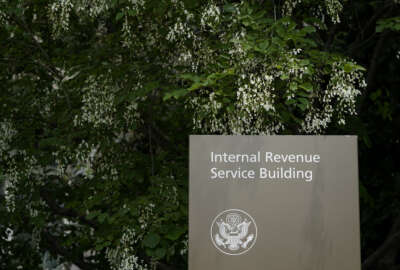Hubbard Radio Washington DC, LLC. All rights reserved. This website is not intended for users located within the European Economic Area.
What good is federal grant money if you can’t get your hands on it?
The Build Back Better Act, passed nearly two years ago, secured over $2 trillion for many aspects of the Biden Administration's agenda, one of which includes in...
The Build Back Better Act, passed nearly two years ago, secured over $2 trillion for many aspects of the Biden Administration’s agenda, one of which includes infrastructure projects for state and local governments. But accessing grant money isn’t as simple as sending a Venmo request. There’s a lot that goes into showing exactly how and what the money would be used for, a process not many know how to navigate. To help, members of Congress have introduced a bill tasking the Economic Development Administration to make itself available to aide local governments in predevelopment procedures. One of those congressmen is Louisiana’s Troy Carter, who spoke with Federal Drive with Tom Temin Executive Producer Eric White about the Economic Empowerment Through Predevelopment Act.
Interview Transcript:
Rep. Troy Carter (R-La) I started my career in local government, so I know the challenges that rural communities, small governments have with attracting resources for development resources to even govern it. So I’ve always been hypersensitive to try and create bridges, if you will, that will assist small communities, rural communities with the ability to access resources. But I’m also keenly aware that oftentimes they’re not within reach for whatever reason, because of lack of resources, lack of technical assistance, lack of opportunity to access resources. We see this happening in government far too often that communities, whether its business or individuals, academia or our government in this case don’t have the ability to access resources that we fought to get to them because they don’t have the technical assistance. Because something as simple as preparation for the opportunity is a game changer. It’s a game stopper. So having this opportunity, pre-development funding gives an opportunity to assist small communities to get ready to ramp up, to have the resources to access the bigger pie, if you will. Case in point, we passed a $1.2 trillion infrastructure bill. 50% of those funds are going to go direct appropriation to the governors throughout the state. 50% is accessible by grant, but being accessible by grant means nothing if you don’t have a grant rider. Being able to have fun sitting in a pot somewhere means nothing if you don’t have a ladder to get to the pot. This provides that ladder, if you will, that this provides that bridge that will allow small communities, rural communities, to be able to access funds that will get them to the point to be able to get to the larger pot of resources in many ways, an opportunity to level the playing field, giving resources and opportunities for people that have otherwise missed opportunities because they just didn’t have the the ladder to get to the top of the tree.
Eric White You touched on it a little bit, but can you briefly describe to those of us who, you know, may not have as much public policy experience such as yourself, What are pre-development activities and what are involved in them?
Rep. Troy Carter (R-La) So, you know, pre-development can mean something as simple as putting together an application, explaining and defining the need. If you if you envision, you know, in your own household, if we’re talking to a homemaker, if you’re talking to a small business owner, having the ability to to prepare for the ask. Having the ability to ask is one thing. Knowing what to ask for and knowing how to ask for it is something different. Pre-development is showing you what to ask for and how to ask for it, and giving you the tools to do it. I can dump a bunch of lumber in your house and say, Go build a house, and that’s great. But if you aren’t a builder, it’s no good. This gives you some resources to help you figure out how to build it, not just giving you access to the raw material, but giving you access to the tools to actually build it. Career development gives you that opportunity to get ready for the big ask, The big opportunity. And I can’t underscore Eric enough how real this is and in real time of how this impacts people who get intimidated by the paperwork. I mean, you look at a stack of papers and it’s as repetitive and asks for the same thing over and over again. And it’s not always very simple. In fact, oftentimes it’s complex and then ask questions that, you know, you need a Ph.D. in science to be able to access, and you shouldn’t need an MBA or a Ph.D. to figure out how to apply for funds if your intention is to help me. If the intention is for government to make these resources available, we should make it plain. We should make it easy. We should make it accessible. That’s what this does. That’s what the Economic Developer Administration, EDA, the economic empowerment does. It gives us that opportunity through pre-development to make those first few steps in the process a lot easier. And that lays the predicate for what hopefully will be a much more successful outcome.
Eric White We’re speaking with Congressman Troy Carter, who represents Louisiana’s second Congressional District. And that provides a good segue into my next question. You talk about you need a Ph.D. and that goes back to knowledge and training, right? Could the EDA and other federal agencies possibly be doing more to train local officials in just how to get that money out in going across the the dreaded two word red tape?
Rep. Troy Carter (R-La) Absolutely. We could. We should. We will. Again, we’re only as effective as the net outcome of what happens with our efforts. Listen, I was very fortunate and blessed to be appointed to the Regional Leadership Council. 12 members of Congress are appointed by the leader of the Democratic Party to serve as the interface between the President of United States and his Cabinet secretaries to make sure that legislation and resources that we have navigated through the legislative process that have made it to the government, the president’s desk for signature and are now law. That these resources find their ways into the communities having passed it and people not know about it is a waste of time, having passed meaningful legislation and having people who need it most not be able to access it, is a waste of time. Creating opportunity that people can’t reach is not a true opportunity. So yeah, we can do better and it’s a part of our plan. It’s part of my push that we continue to to distill facts, distill opportunities and make them much more digestible, much easier to reach and much, much, much more user friendly. And at the end of the day, we have a long ways to go to kill the bureaucracy, cut through the red tape and demonstrate to people that we’re not just a bunch of stuff shirts. But we’re just regular people who get elected, who come to Washington to really try to make it better for people. And the way you really want to make it better reform is stop playing word games and stop hiding facts and volumes of applications.
Eric White But it is you know, it was these ideas were put there for a reason, obviously, to try and prevent waste, fraud and abuse. Is there a happy medium there where it’s easy for local officials to access grants and cooperative agreements without having that huge risk of people using money for stuff it wasn’t intended for?
Rep. Troy Carter (R-La) Well, you know, that’s a good point. And obviously we have to remain vigilant as it relates to risk associated with with scammers and people who want to game the system. But but helping people fill out an application and making it easier for them to apply does not disallow us from being careful and doing our due diligence to make sure that we are rooting out those that would seek to do harm or to cheat the system. Listen, the reality is one cheat is too many, but there are far more people. Far, far, far The great majority of Americans are doing the right thing. We shouldn’t penalize them because we got a couple of jerks out there trying to beat the system. We got to find those jerks when we get them and shut them down and bring them to justice. But I don’t want to sit around with a bucket of water with a bunch of thirsty people, afraid to give them water because there might be one or two people in the crowd that really are thirsty. You know that, that’s a bad analogy. That’s a bad process. You know, I’d rather give a little bit water to two people that weren’t thirsty than to starve 100 that really needed it.
Copyright © 2024 Federal News Network. All rights reserved. This website is not intended for users located within the European Economic Area.
Eric White
Eric White is news anchor and Federal Drive producer at Federal News Network.
Follow @FEDERALNEWSCAST
Related Stories
The Federal Permitting Council gets a new lease on life thanks to new infrastructure spending
How the federal government is reorienting its innovation and economic development funding to focus on places
Related Stories
-
The Federal Permitting Council gets a new lease on life thanks to new infrastructure spending Facilities/Construction





